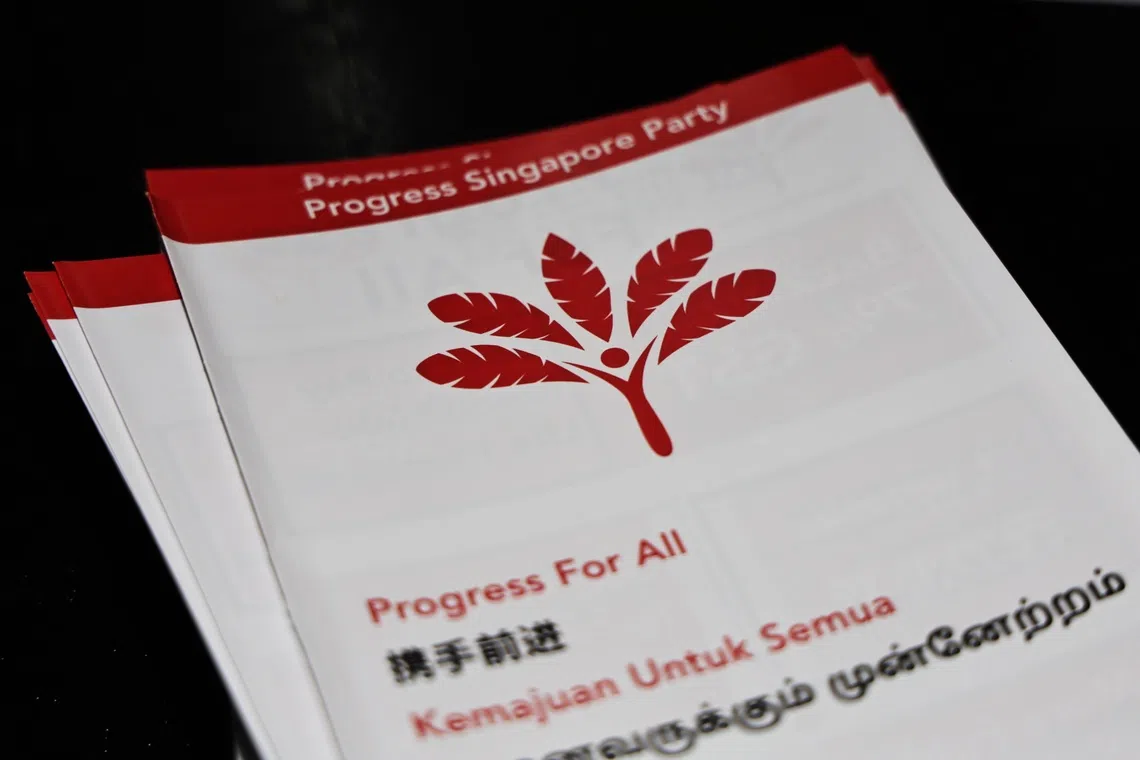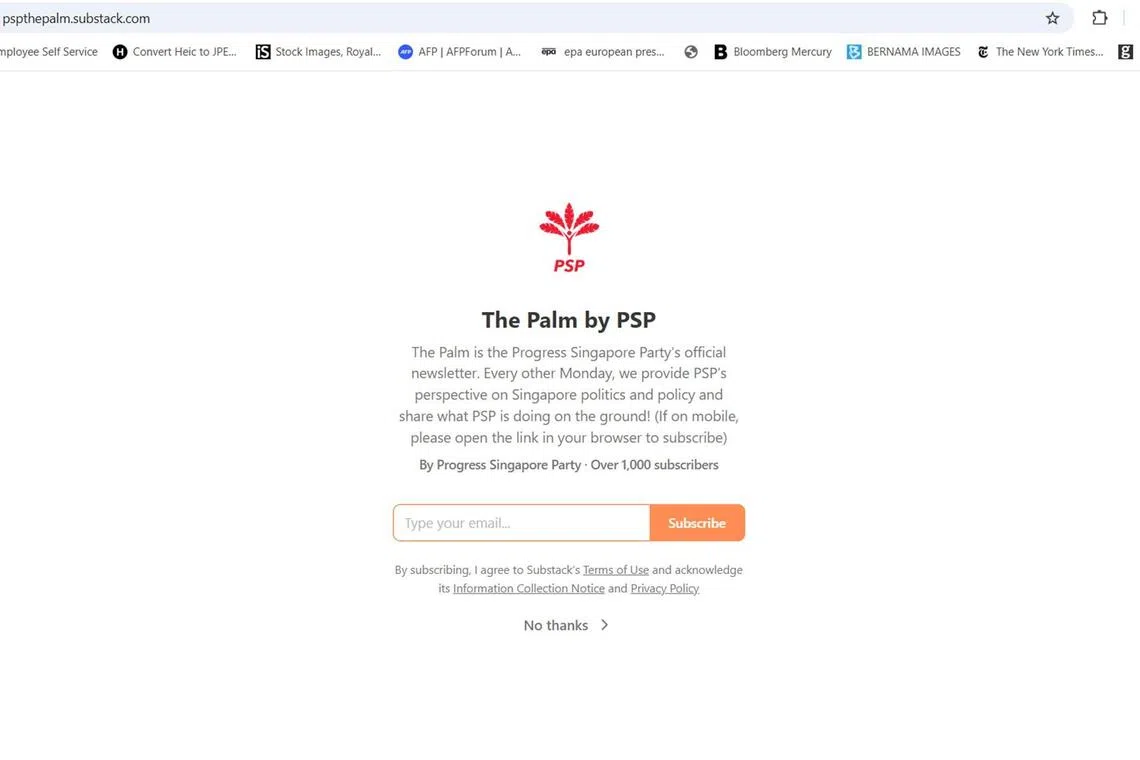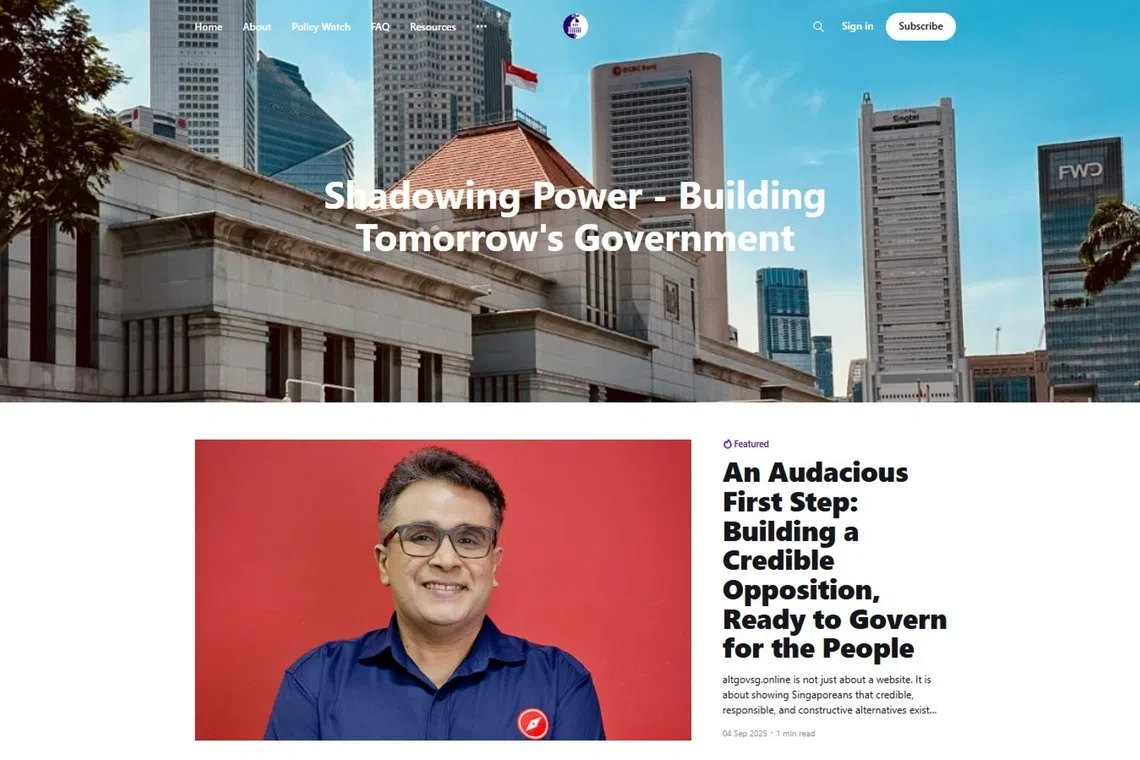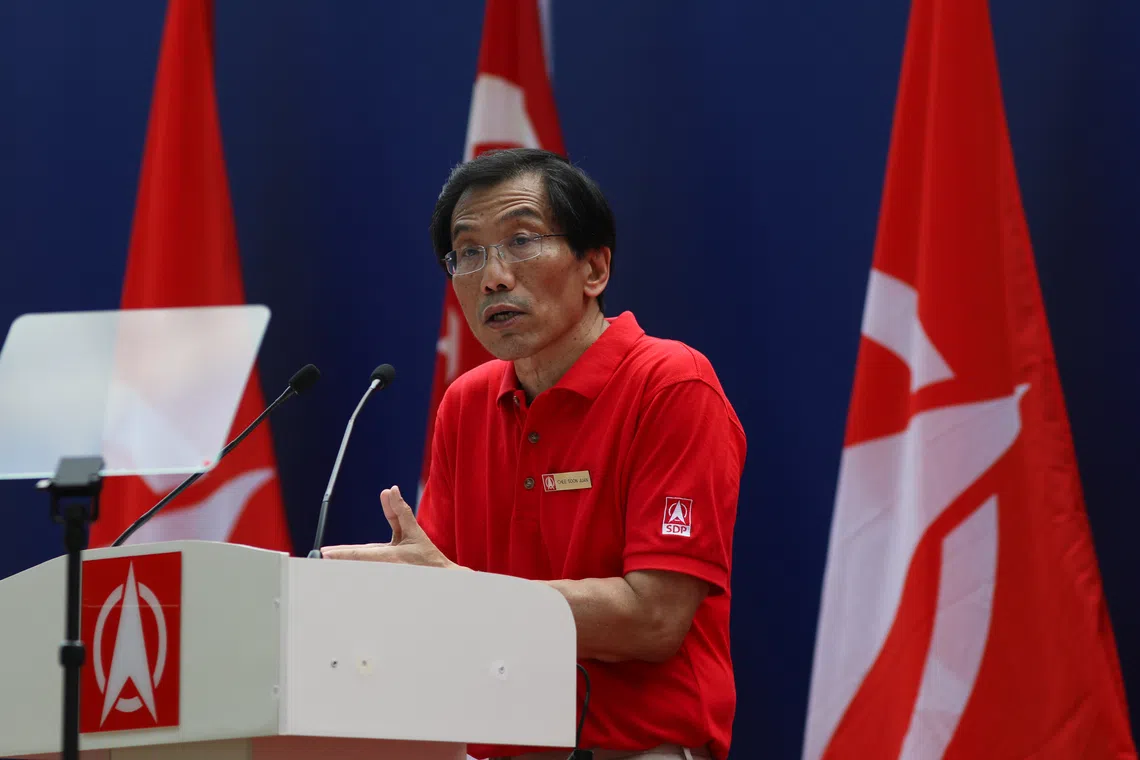Opposition parties left out of Parliament after GE2025 find new ways to reach S’poreans, offer ideas
Sign up now: Get ST's newsletters delivered to your inbox

Among the opposition parties to start up a new initiative is Progress Singapore Party, which has moved its party paper The Palm onto online newsletter platform Substack.
PHOTO: ST FILE
Follow topic:
- Opposition parties in Singapore, after GE2025 losses, are launching new channels to stay relevant and contribute discourse.
- PSP launched a Substack newsletter, RDU created AltGovSG to "shadow the government", and SDP announced Roadmap2030.
- Analysts note the urgency for outreach, the cost-effectiveness of online platforms, and the need to sustain efforts until the next election.
AI generated
SINGAPORE – Opposition parties that came away empty-handed at the 2025 General Election have established new channels as they seek to capture a share of national attention that has now turned to Parliament.
These initiatives add to tried-and-tested tactics, like house visits, and kick-start the parties’ five-year journeys to the next contest after an election where almost all opposition parties lost vote share.
Several parties launched initiatives ahead of the opening of the House on Sept 5
The Progress Singapore Party – which received 36.3 per cent of the vote in the areas it contested, the highest among the unelected – moved its party paper The Palm onto online newsletter platform Substack on Aug 25.
Published fortnightly, the newsletter offers PSP’s view and alternative solutions on the big policy and political issues of the day.
Party chief Leong Mun Wai told The Straits Times that PSP is the first opposition party to start a digital newsletter.
“We will continue to contribute to the political discourse in Singapore by regularly responding to current events and providing constructive ideas on how to take Singapore forward,” he said.
The party is out of the 15th Parliament after being represented by Non-Constituency MPs Leong Mun Wai and Hazel Poa in the 14th. The opposition contingent in Parliament now comprises 12 Workers’ Party MPs.

Published fortnightly, the newsletter offers PSP’s view and alternative solutions on the big policy and political issues of the day.
PHOTO: SCREENGRAB FROM THE PALM BY PSP
Meanwhile, Red Dot United – which fielded the second-highest number of opposition candidates at the contest behind WP – launched AltGovSG.Online, a platform dedicated to “shadowing the government” and presenting policy alternatives, with secretary-general Ravi Philemon appointed “shadow minister” for social policies.
In other parliamentary democracies, shadow Cabinets are formed by elected opposition MPs to hold the ruling government to account and provide alternative policies.
RDU said it would start with “urgent issues that affect everyday Singaporeans”, like bullying in schools, youth employment and the well-being of hawkers and gig workers.
“Parliament may be locked for now, but Singapore’s problems do not wait for official platforms,” said a spokesperson, adding that the party continues to cover ground in the four wards it contested and in Bukit Gombak SMC.
“We listen to concerns ranging from bread-and-butter issues to systemic reform, and we offer AltGovSG as a place to turn input into actionable policy.”

RDU, which fielded the second-highest number of opposition candidates at the contest behind WP, launched AltGovSG.Online.
PHOTO: SCREENGRAB FROM ALTGOVSG
At AltGovSG’s launch on Sept 4, RDU said it intends for selected opposition parties to eventually co-steward the platform. RDU has spoken to other parties about coming on board and feedback has been positive.
The Singapore Democratic Party, whose chief Chee Soon Juan came closest to a seat in the House, also launched several initiatives after GE2025.
On Aug 2, SDP announced Roadmap2030. Projects under this plan include building a non-political community network with trained facilitators to provide civic education, and forming an electoral reform coalition of opposition parties, civil society organisations and academics.
Political observers said that these new initiatives are how the parties are looking to stay relevant and put themselves in the best possible position for the next election, which must be held by September 2030.
“There is no time to lick their electoral wounds,” said SMU law don Eugene Tan.
There is an urgency to embark on outreach, given that they do not have any parliamentary presence, he added.
Leaning into strengths, working around resource gaps
The new platforms are useful for highlighting the opposition parties’ public brands, and somewhat address gaps in financial and manpower resources, observers said.
NUS political science associate professor Chong Ja Ian said the different approaches taken by the parties partially reflect how they see themselves.
PSP and RDU emphasise their support for citizens’ oversight of parliamentary and executive branch work, while SDP’s desire to put forward new ideas and thinking about local politics is something it has typically leaned heavier on, Prof Chong said.
Not having a presence in Parliament makes it more difficult to bring attention to their ideas, as they traditionally receive limited coverage in the mainstream media, he added.
Good public outreach also comes down to resources and manpower, noted independent political observer Felix Tan.
Online platforms offer practical advantages, being cost-effective, accessible and an efficient way to engage a broad segment of younger Singaporeans, he said.
For some parties, the new channels could also be an effort to build on momentum from the election.
SMU’s Associate Professor Tan said: “For some, like RDU and SDP, they are perhaps encouraged by their GE2025 showing even though they didn’t win any seats.
“For them, they probably do not want to lose the momentum and may even be redoubling their efforts to avoid being consigned to the political wilderness.”
The SDP got about 31 per cent of the votes in the 11 seats it contested, with party chief Mr Chee getting 46.81 per cent of the vote in Sembawang West.

The SDP got about 31 per cent of the votes in the 11 seats it contested, with party chief Mr Chee getting 46.81 per cent of the vote in Sembawang West.
PHOTO: BT FILE
The RDU got 23.4 per cent of the vote across 15 seats in its second electoral outing after its 2020 debut.
PSP and RDU said they have already seen some gains from their new channels.
The RDU spokesperson said its platform is already doing what the party intended, despite being just a week old, by attracting Singaporeans with deep interest in the policy areas it is working on.
The spokesperson added that more than 40 young Singaporeans have participated in its youth survey, providing thoughtful feedback and policy ideas.
PSP’s Mr Leong said the party has received positive feedback about the newsletter and has had “a steady stream” of subscribers. A check on Substack showed more than 1,500 subscribers as at Sept 14.
The SDP declined to comment.
Success for these parties would be if Singaporeans take up some of these ideas and can attribute them to the parties, and then have these ideas translate into votes, NUS’ Prof Chong said.
Time will tell if these new platforms will turn in success at the polls, with observers noting that traditional methods of outreach still count for Singaporeans.
Dr Gillian Koh, senior research fellow at the Institute of Policy Studies, said opposition parties have to build their standing by addressing policy issues and creating a signature theme or programme.
But they will also have to prove they have the managerial nous to deal with municipal issues, with a bit of track record of effective service to the community, she added.
SMU’s Prof Tan said: “Stung into action, the question is whether the parties can sustain their efforts over the next five years, which requires walking the ground, financial resources, and overcoming rejection or indifference.”

